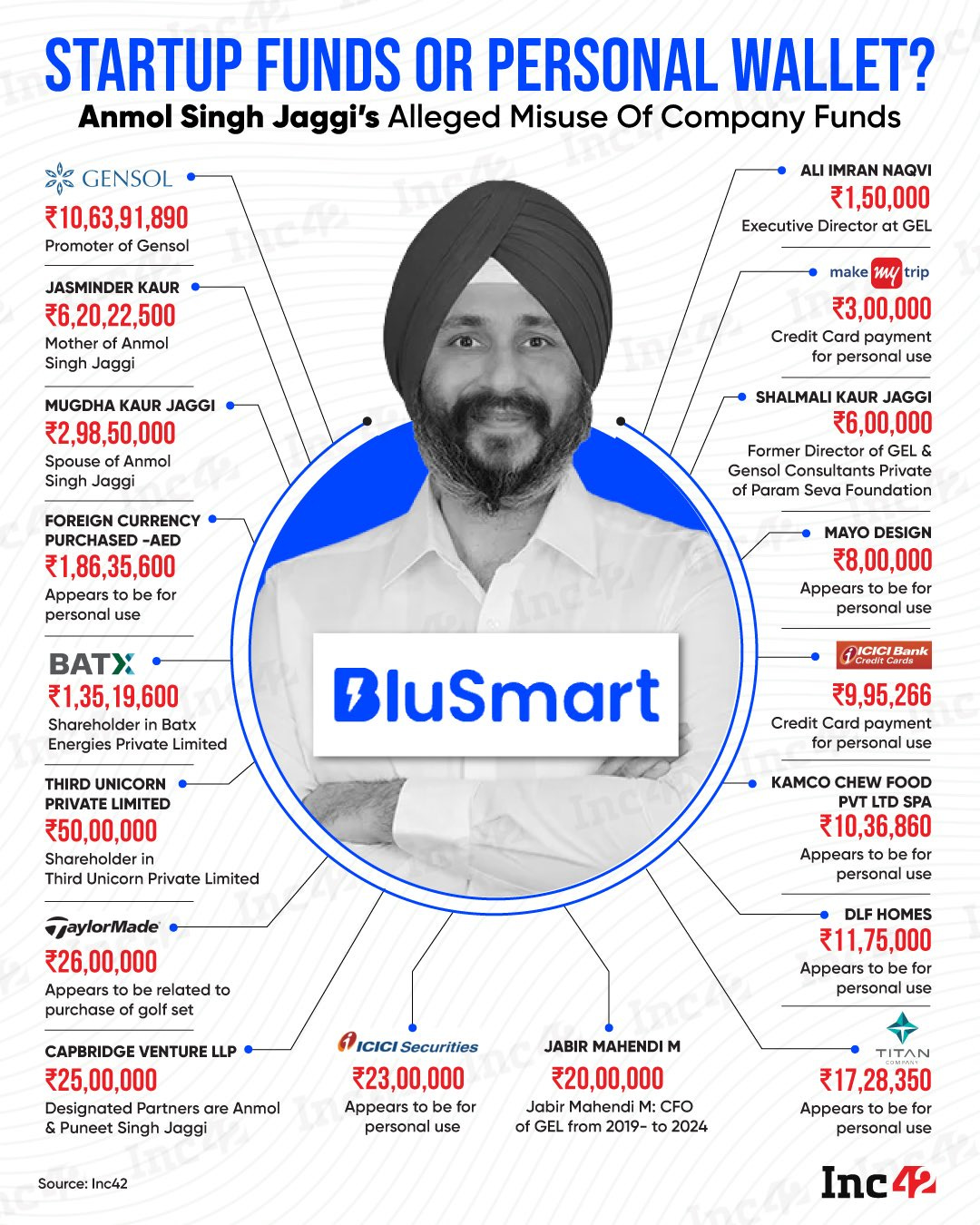Welcome back,
This week is a fraud-heavy newsletter. The CEO of shamed startup eFishery gave a lengthy interview to Bloomberg in which he appeared to (try to) justify manipulating numbers and misleading investors. He claimed the practice is standard among startups and it was justified given his company’s goal of serving Indonesia’s fish farmers.
There’s also a developing story from India where the founders of the parent company to BluSmart, an EV-focused rival to Uber and Ola, are being investigated for misusing company funds. That may be the start of other revelations around the two companies, which are financially intertwined.
Elsewhere, there’s more chaos courtesy of US government tariffs and restrictions, with Temu, Shein, TikTok and Nvidia in the firing line.
Have a great rest of the week.
Best,
Jon
Follow the Asia Tech Review LinkedIn page for updates on posts published here and interesting things that come our way. If you’re a news junkie, the ATR Telegram news feed has you covered with news as-it-happens or join the community chat here.
Fresh from the revelations inside eFishery, a story of alleged startup fraud is unfolding at India-based ride-hailing startup BluSmart and its parent company Gensol Engineering, a power solutions company that’s been listed publicly since 2019.
BluSmart was a leading rival to Uber and Ola and it had raised some $200 million from investors that include BP Ventures, but its future appears in doubt. India’s market regulator launched an investigation into Gensol and BluSmart over the apparent misuse of loans for electric vehicle purchase. It is alleged that the funds were used by the founders—who are involved in both companies—to purchase real estate.
That may just be the start of things, however.
Unlike Uber, Ola and other ride-hailing companies that lease vehicles from drivers, BluSmart loaned most of its fleet from Gensol. Alarm bells began ringing last month when credit rating agencies downgraded Gensol’s rating as BluSmart had defaulted on payments for its fleet. There are also allegations from Gensol lenders about delays and falsified records regarding its loan obligations.
The misuse of loans is said to be “neither isolated nor contained,” according to the investigation, and already the dominos have begun to fall:
Inc42 has this chart on the alleged misuse of funds
Keep an eye out for more revelations.
eFishery was heralded as a Southeast Asia success story—ATR among them—but that came apart when news of its falsifying accounts came out in January. Now, CEO Gibran Huzaifah has come forward and tried to justify altering figures to raise funding and grow its business with a Bloomberg interview.
To sum it up, Huzaifah claims he faked the numbers because other startup founders had told him they’d done the same and to ultimately help the fish farmers that eFishery developed services for. He claimed, also, that employees were unaware and the money wasn’t stolen.
But the sheer level of falsification is dizzying:
“The company claimed revenues of $752 million in the first nine months of 2024, while the true number was just $157 million,” Bloomberg wrote.
Massively inflated figures drew in the likes of SoftBank, Temasek, Sequoia (now Peak XV) and more who raised eFishery’s valuation to more than $1 billion.
eFishery offered a bright spot in a region (and country) where startups have struggled. This has broken the trust even further. There is no justification or apology that cuts it.
The only question now is what action authorities take on this brazen case of fraud.
Playing the politics game is risky, especially in the US, as Nvidia just found.
The Biden administration cracked down on areas where it believed US tech firms were ‘helping’ the Chinese tech industry to grow, with a major focus on chips and AI. That led Nvidia to develop a dedicated Chinese chip (the H20) which was suitably underpowered so that it complied with US restrictions.
Now, though, the Trump government requires a license for Nvidia to ship the H20 to China. The result could be wide-ranging and even counter-productive for America’s long-term goals:
-
Nvidia will take a $5.5 billion hit due to unused inventory, purchase agreements etc
-
The company could lose out on the Chinese market, which was 13% of 2024 revenue (20% in 2023)
-
Nvidia loss could be Huawei’s gain—additional customers and revenue could super-charge the Chinese tech giant, which the US government has consistently tried to hobble
Huawei has launched new AI architecture and that is likely to just be the start of its new focus. In response, Nvidia CEO Jensen Huang went to Beijing to meet officials, and commit to deepening its presence in the Chinese market.
Next up: Washington is looking into ways it can curb DeepSeek and also whether the Chinese AI company used Nvidia chips that it wasn’t supposed to have access to.
Plus it is also investigating the semiconductor supply chain, which potentially could see tariffs placed on imports as part of the broader goal of bringing manufacturing and production to US shores. Experts have broadly been critical of any suggestion that the US can take on Asia, given the complexities of the supply chain, the sheer number of countries involved and the years of training, building, development, and other factors involved.
Temu and Shein are facing uncertainty in the US with the Trump government set to end the de minimis exemption, which allowed goods valued under $800 to face no tariffs, taxes or duties.
From next month, all packages will incur a fee of at least $100, that’ll double to $200 in June. This change would hugely impact the concept of sending low cost goods to US consumers. The changes will force the companies to increase prices, both have confirmed, but it isn’t clear what that will look like.
Shein and Temu have seen a surge in business before the price change comes into force, as panicked customers stock up and buy while they can. Temu and Shein addicts have also flocked to other apps, including Alibaba’s Taobao and DHgate, a wholesaler platform that surged into the top five apps in the US. In contrast, Temu pulled its Google Shopping ads which saw its App Store rank drop.
Trump has hit pause a number of his controversial policies that have had seismic impact on companies, and consumers—but these changes, should they come into effect, are going to be tough for quick commerce startups to deal with.
AI startup Zhipu, which is backed by Alibaba and Tencent, might be headed to the public markets after it hired a firm to prepare a listing as soon as this year link
A state-owned company previously sanctioned by the US for facilitating human rights abuses against Uyghurs is training police officers in Tibet on hacking techniques and digital forensics link
China has accused three US NSA operatives of hacking the Asian Winter Games, naming individuals and detailing how the attacks were allegedly carried out through a secretive cyber unit link
Tencent-backed household robot maker Narwal, which develops robot vacuums and mops, raised $100M to explore new AI-based products link
Short video app Kuaishou has launched an AI video generator feature of its own link
China’s growing stash of seized crypto is reportedly pushing local governments to find ways to offload it, while courts and the financial sector call for clearer regulation link
TikTok is testing Footnotes, a new Community Notes-like feature link
JD.com plans to hire 50,000 delivery workers and promise deliveries in under 30 minutes as it enters the on-demand services space to rival Meituan link
TikTok US public policy chief Michael Beckerman, a key architect of TikTok’s efforts to fight a US government ban, has said he is planning to leave Washington and transition to a global advisory role, according to a memo sent to staff viewed by The Information link
China is banning automakers from using terms like “smart driving” and “autonomous driving” in ads for driver-assistance features, and plans to tighten rules on related tech upgrades link
Some of Britain’s most secure military sites are restricting electric cars over fears Chinese tech in the vehicles could be used for spying link
Here’s mad story: 21 ‘humanoid’ robots raced in a half-marathon against human competitors—but the robots struggled with just four finishing the race, and all far down the rankings link
Fintech startup Cred is in talks to raise $100–200M from existing investors at a $4B valuation—though that’s down from $6.4B three years ago. The round is expected to be led by Singapore’s GIC, with participation from Peak XV, Tiger Global, Ribbit Capital, and QED Innovation Labs link
Foxconn is aiming to expand into EV manufacturing in India with the news that it is in talks to acquire 300 acres along the Yamuna Expressway in Greater Noida for its first northern India facility link
The country plans to onboard 200-300M new users to UPI in order to reduce reliance on cash—features will include delegated accounts for children and household staff to expand access link
India is betting on frugal innovation and its vast tech talent to catch up in the global AI race—officials and startups believe it can compete by building low-cost language models in Indian languages and AI tools for local problems link
The private credit arm of fintech startup InCred is raising $174M link
Foxconn’s iPhone factory is fueling a real estate boom in a small Indian farming town—the $2.5B “Project Elephant” will be the company’s second-largest factory outside China and create 40,000 jobs link
India has finalised its electronics components scheme as it eyes major export growth link
Thai security forces are behind a campaign doxxing pro-democracy activists on Facebook and X, urging followers to harass them, cybersecurity watchdog Citizen Lab said link
A leaked TikTok memo has revealed changes to its e-commerce division that give more power to Chinese and Singaporean leaders link
South Korea has increased its support package for the semiconductor industry to $23.25B, a 25% rise from last year—it also boosted its financial assistance program for the chip sector to $14B, up 15% to help companies manage higher costs and remain competitive globally link
Startup RLWRLD raised $14.8M to build a foundational model for robotics link
The country’s Financial Services Commission (FSC) has delisted 14 crypto exchange apps from Apple’s App Store and 17 from Google Play as part of a crackdown on unregistered foreign platforms link
Despite the success of locally made series including smash hit ‘Squid Game’, South Koreans are choosing YouTube over Netflix, according to a new report link
Japan’s antitrust regulator ordered Google to stop allegedly abusing its market power over local smartphone makers link
TDK claims a breakthrough in optical tech that processes data 10x faster than current electronics, potentially easing a major bottleneck for generative AI—it demonstrated the world’s first “spin photo detector,” combining optical, electronic, and magnetic elements for 20-picosecond response times—possibly replacing current semiconductor-based data transfer systems link
Telco NTT has become an under-the-radar AI powerhouse, according to Bloomberg link
US startup Astranis Space Technologies will launch Taiwan’s first dedicated communications satellite, in partnership with Chunghwa Telecom, to help maintain communications during a potential Chinese invasion link
TSMC is finalizing specifications for a new chip packaging approach to meet growing AI chip demand, with production set to begin around 2027—unlike traditional 300mm round wafers, TSMC’s “panel-level” technology will use square substrates, allowing more semiconductors and improving computing performance link
TSMC denied that it has a chip tie-up with struggling giant Intel link






